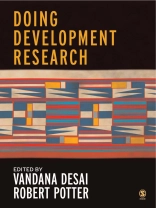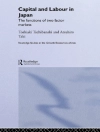Doing Development Research is a comprehensive introduction to research in development studies, that provides thorough training for anyone carrying out research in developing countries. It brings together experts with extensive experience of overseas research, presenting an interdisciplinary guide to the core methodologies.
Informed by years of research experience, Doing Development Research draws together many strands of action research and participatory methods, demonstrating their diverse applications and showing how they interrelate. The text provides:
· an account of the theoretical approaches that underlie development work
· an explanation of the practical issues involved in planning development research
· a systematic overview of information and data collecting methods in three sub-sections:
· methods of social research and associated forms of analysis
· using existing knowledge and records
· disseminating findings/research
Using clear and uncomplicated language – illustrated with appropriate learning features throughout – the text guides the researcher through the choice of appropriate methods, the implementation of the research, and the communication of the findings to a range of audiences. This is the essential A-Z of development research.
Spis treści
PART ONE: INTRODUCTION
The Raison d′etre of Doing Development Research
PART TWO: STRATEGIC ISSUES IN PLANNING SOUND RESEARCH
Doing Fieldwork in Developing Countries – Tony Binns
Planning and Logistics
Ethical Practices in Doing Development Research – Lynne Brydon
Working in Different Cultures – Caesar R A Apentiik and Jane L Parpart
Issues of Race, Ethnicity and Identity
Women, Men and Fieldwork – Janet Henshall Momsen
Gender Relations and Power Structures
Working with Children in Development – Lorraine van Blerk
Collecting Sensitive and Contentious Information – Margaret E Harrison
Dealing with Conflicts and Emergency Situations – Morten Boas, Kathleen M Jennings and Timothy M Shaw
Working with Partners – Bill Gould
Educational Institutions
Working with Partners – Mansoor Ali and Andrew Cotton
Government Ministries
Working with Partners – Claire Mercer
NGOs and CBOs
Doing Development Studies ′At Home′ – Tim Unwin
PART THREE: INFORMATION AND DATA COLLECTION METHODS
METHODS OF SOCIAL RESEARCH AND ASSOCIATED FORMS OF ANALYSIS
Quantitative, Qualitative or Participatory – Linda Mayoux
Which Method, for What and When?
Field Surveys and Inventories – David Barker
Interviewing – Katie Willis
Focus Groups – Sally Lloyd-Evans
Your Questions Answered: Conducting Questionnnaire Surveys – David Simon
Lost in Translation? The Use of Interpreters in Fieldwork – Janet Bujra
Ethnographic and Participant Observation – Jan Kees van Donge
Participatory Methods and Approaches – Harriot Beazley and Judith Ennew
Tackling the Two Tyrannies
Diaries and Case Studies – Jo Ann Mc Gregor
USING EXISTING KNOWLEDGE AND RECORDS
Literature Reviews and Bibliographic Searches – Paula Meth and Glyn Williams
Using the Indigenous Local Knowledge and Literature – Cathy Mc Ilwaine
Using Images, Films and Photography – Cheryl Mc Ewan
Using Archives – Michael Jennings
Remote Sensing, GIS and Ground Truthing – Denis Conway and Shanon Donnelly
The Importance of Census and Other Secondary Data in Development Studies – Allan M Findlay
Using the World Wide Web for Development Research – Emma Mawdsley
Data from International Agencies – Jonathan Rigg
DISSEMINATING FINDINGS/RESEARCH
Writing an Effective Research Report or Dissertation – Steve Morse
How is Research Communicated Professionally? – Sally Gainsbury and Cheryl Brown
O autorze
Professor Rob Potter is Professor of Human Geography at the University of Reading. His research and teaching interests span development geography and development studies; urban geography; return migration; transnationality and issues of identity. He is author of the texts Key Concepts in Development Geography (Sage, 2012), Geographies of Development (Pearson-Prentice Hall, 2008), The Companion to Development Studies (Hodder, 2008), Doing Development Research (Sage, 2006) and The Contemporary Caribbean, Pearson-Prentice Hall, 2005). He is the founding Editor-in-Chief of the interdisciplinary journal Progress in Development Studies and is currently a member of the International Editorial Boards of the journals Third World Quarterly, Journal of Eastern Caribbean Studies, and Blackwell Geography Compass. Rob Potter was elected to the Academy of Social Sciences in 2006 and in 2007 was awarded the degree of Doctor of Science (DSc) by the University of Reading, in recognition of his contributions to the fields of Geographies of Development and Urban Geography.












